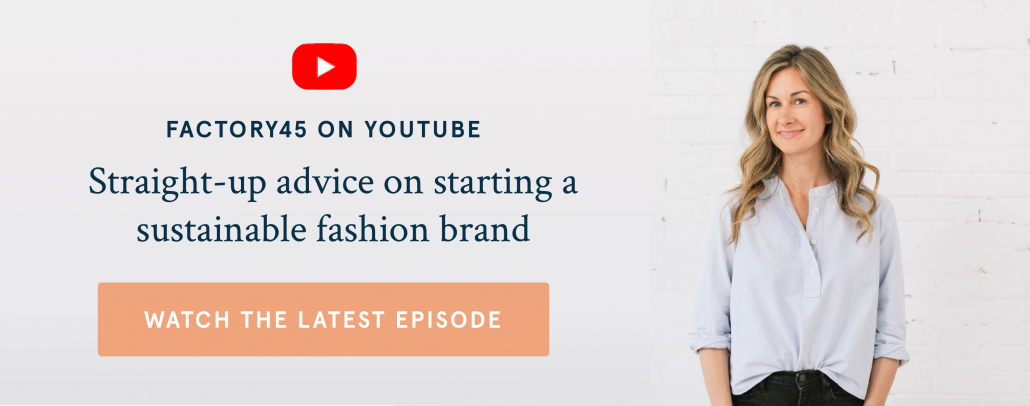Ep. 11 Why Competition is a Good Thing (Even When it Gives You a Panic Attack)
Listen on Apple Podcasts | Listen on Spotify
As someone who works with and mentors new entrepreneurs on a regular basis, I’m no stranger to panicked emails popping up in my inbox about the discovery of a competitor. As soon as we discover potential competition, our cortisol levels shoot through the roof and we imagine the worst case scenario. In today’s episode, I’m talking about why competition is actually a good thing, even when it gives you a panic attack.
Resources mentioned in this episode:
The Lean Startup by Eric Ries
TRANSCRIPT
Hello, everyone and welcome back! I have an important announcement at the end of this episode, so make sure to listen to the end… so you don’t miss it.
Have you ever had these thoughts?
You see another brand on Instagram and you think, “Gah, that’s pretty much what I’m doing.”
Or “She’s selling the same thing I am.”
Or “I just found out this person is also making the same product, so what’s the point in me even trying?”
As someone who works with and mentors new entrepreneurs on a regular basis, I’m no stranger to panicked emails popping up in my inbox about the discovery of a competitor.
“And she’s so much farther along!”
“And they already have 3,000 followers on Instagram!”
“They’re using organic cotton and making it in the USA, too!”
As soon as we discover potential competition, our cortisol levels shoot through the roof and we imagine the worst case scenario.
EVERYONE is going to buy from THEM instead of ME.
So I might as well quit.
And while yes, quitting is the easiest route to take (in any situation) there are many more reasons to keep going.
In Eric Ries’ book, The Lean Startup, he says early-stage entrepreneurs spend too much time worrying about their idea being stolen and not enough time telling as many people about it as possible.
As a startup, Ries says you should focus on talking about your idea to anyone and everyone willing to listen. That’s the only way to get early customer feedback, hear what your potential customers actually want and find out if your idea is a viable business.
There is a big difference between someone saying you have a great idea and actually getting out their wallet to pay for it.
When early stage entrepreneurs worry too much about protecting their idea, Eric Ries calls this “stealth mode.”
He says: “Part of the special challenge of being a startup is the near impossibility of having your idea company, or product be noticed by anyone, let alone a competitor.”
Makes sense, right? Stealing an idea is a lot different than stealing an idea and actually implementing it — especially an idea that hasn’t proven to be successful yet.
If you do reach a degree of success down the road, then competitors are bound to enter the market. People see something that works, and they want to have a piece of it — this comes with the territory.
The thing is, as hard as it may be to take it gracefully in the moment, competition is a good thing — it pushes us to continue innovating and prevents us from getting stagnant.
So, with that all said, here are some other things to consider the next time you’re faced with copycats or competition that makes your stomach flip:
- An idea is just an idea. Everyone has them. What sets you apart is your ability to execute. 99% of ideas never see the light of day, so if you’re able to get your product to market, then you’re already that much farther ahead than everyone else. So much of entrepreneurship is simply a matter of keeping your head down and doing the work. It’s not glamorous, but there’s really no alternative.
- The “me versus them” mentality is the fastest way to sabotage yourself. As soon as you start thinking the world is against you and the universe is set up for you to fail, then it’s over. I’ve never met a successful entrepreneur who didn’t operate with an “abundance mentality.” Repeat after me: there are enough customers for me and there are enough customers for them.
- Competition breeds creativity. Having competitors in the market forces you to innovate, think outside the box and pushes you to do better than you would have done if you had a monopoly. While it may give you anxiety at first, you have the ability to reframe how it makes you feel. It can either deflate you or empower you — and you have the power to choose.
- Competition shows you there is a need in the marketplace. Having other players in the game means there is a big enough pool of people who want what you’re selling. The market share is there and it’s your job to find a way to take a piece of the pie.
- The great news about being in the clothing business is that, unless you’re selling to nudists, everyone needs it. Fashion is a $1.5 trillion dollar industry. That’s a lot of people buying clothing. And the average American buys 62 pieces of clothing a year. As fast fashion continues to gross more people out, you’re there to provide an alternative ethical option. How cool is that?
- And this. This is the best reason of all: Despite how many people are selling (or plan to sell) something similar to you, no one is ever going to do it the same way you are. That’s just fact. There is no one else on this planet that is even remotely close to the same person as you and thus, the way you create is going to be different from everyone else.
No matter how many new kids lines or womenswear lines or outwear lines debut, they’re all going to be unique to their creator. And that’s why it’s so important to know who your target customer is. It relieves you from having to sell to “everyone” so you can focus on selling to the special group of people it’s made for. There is so much freedom in that.
I’ve talked about competition a lot on the blog, in my live shows, and with my Factory45 entrepreneurs – it’s the topic that continues to come up because it’s so much scarier when you’re just starting out.
Working with mostly women entrepreneurs has taught me how sensitive most of us are. We want perfection, we want everything to go the right way the first time, and we want to show everyone around us that we can do it.
As soon as we hit a bump in the road, we tend to question our intentions.
We say to ourselves, Who was I to think I could pull this off?
When really, who are you not to?
Okay, so my big announcement – on March 14th I’m hosting a free four-day workshop that will teach you the essential building blocks of starting a sustainable fashion brand in 2022. But here’s the thing, this year I’m hosting it as a private, invite-only event for a select group of people who are serious about starting their brands this year. The good news is, if that sounds like you, you can request an invite by going to the link in the description below. So make sure to check that out, see if it looks like something that could help you take action this year and request your invite to join me from March 14th to 17th!



